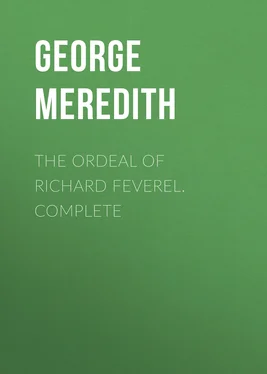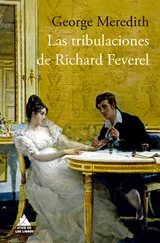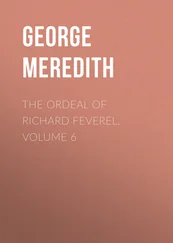George Meredith - The Ordeal of Richard Feverel. Complete
Здесь есть возможность читать онлайн «George Meredith - The Ordeal of Richard Feverel. Complete» — ознакомительный отрывок электронной книги совершенно бесплатно, а после прочтения отрывка купить полную версию. В некоторых случаях можно слушать аудио, скачать через торрент в формате fb2 и присутствует краткое содержание. Жанр: foreign_prose, literature_19, foreign_antique, на английском языке. Описание произведения, (предисловие) а так же отзывы посетителей доступны на портале библиотеки ЛибКат.
- Название:The Ordeal of Richard Feverel. Complete
- Автор:
- Жанр:
- Год:неизвестен
- ISBN:нет данных
- Рейтинг книги:4 / 5. Голосов: 1
-
Избранное:Добавить в избранное
- Отзывы:
-
Ваша оценка:
- 80
- 1
- 2
- 3
- 4
- 5
The Ordeal of Richard Feverel. Complete: краткое содержание, описание и аннотация
Предлагаем к чтению аннотацию, описание, краткое содержание или предисловие (зависит от того, что написал сам автор книги «The Ordeal of Richard Feverel. Complete»). Если вы не нашли необходимую информацию о книге — напишите в комментариях, мы постараемся отыскать её.
The Ordeal of Richard Feverel. Complete — читать онлайн ознакомительный отрывок
Ниже представлен текст книги, разбитый по страницам. Система сохранения места последней прочитанной страницы, позволяет с удобством читать онлайн бесплатно книгу «The Ordeal of Richard Feverel. Complete», без необходимости каждый раз заново искать на чём Вы остановились. Поставьте закладку, и сможете в любой момент перейти на страницу, на которой закончили чтение.
Интервал:
Закладка:
“I come to you direct,” the baronet explained. “I tell you candidly what way I discovered my son to be mixed up in this miserable affair. I promise you indemnity for your loss, and an apology that shall, I trust, satisfy your feelings, assuring you that to tamper with witnesses is not the province of a Feverel. All I ask of you in return is, not to press the prosecution. At present it rests with you. I am bound to do all that lies in my power for this imprisoned man. How and wherefore my son was prompted to suggest, or assist in, such an act, I cannot explain, for I do not know.”
“Hum!” said the farmer. “I think I do.”
“You know the cause?” Sir Austin stared. “I beg you to confide it to me.”
“‘Least, I can pretty nigh neighbour it with a gues,” said the farmer. “We an’t good friends, Sir Austin, me and your son, just now—not to say cordial. I, ye see, Sir Austin, I’m a man as don’t like young gentlemen a-poachin’ on his grounds without his permission,—in special when birds is plentiful on their own. It appear he do like it. Consequently I has to flick this whip—as them fellers at the races: All in this ‘ere Ring’s mine! as much as to say; and who’s been hit, he’s had fair warnin’. I’m sorry for’t, but that’s just the case.”
Sir Austin retired to communicate with his son, when he should find him.
Algernon’s interview passed off in ale and promises. He also assured Farmer Blaize that no Feverel could be affected by his proviso.
No less did Austin Wentworth. The farmer was satisfied.
“Money’s safe, I know,” said he; “now for the ‘pology!” and Farmer Blaize thrust his legs further out, and his head further back.
The farmer naturally reflected that the three separate visits had been conspired together. Still the baronet’s frankness, and the baronet’s not having reserved himself for the third and final charge, puzzled him. He was considering whether they were a deep, or a shallow lot, when young Richard was announced.
A pretty little girl with the roses of thirteen springs in her cheeks, and abundant beautiful bright tresses, tripped before the boy, and loitered shyly by the farmer’s arm-chair to steal a look at the handsome new-comer. She was introduced to Richard as the farmer’s niece, Lucy Desborough, the daughter of a lieutenant in the Royal Navy, and, what was better, though the farmer did not pronounce it so loudly, a real good girl.
Neither the excellence of her character, nor her rank in life, tempted Richard to inspect the little lady. He made an awkward bow, and sat down.
The farmer’s eyes twinkled. “Her father,” he continued, “fought and fell for his coontry. A man as fights for’s coontry’s a right to hould up his head—ay! with any in the land. Desb’roughs o’ Dorset! d’ye know that family, Master Feverel?”
Richard did not know them, and, by his air, did not desire to become acquainted with any offshoot of that family.
“She can make puddens and pies,” the farmer went on, regardless of his auditor’s gloom. “She’s a lady, as good as the best of ‘em. I don’t care about their being Catholics—the Desb’roughs o’ Dorset are gentlemen. And she’s good for the pianer, too! She strums to me of evenin’s. I’m for the old tunes: she’s for the new. Gal-like! While she’s with me she shall be taught things use’l. She can parley-voo a good ‘un and foot it, as it goes; been in France a couple of year. I prefer the singin’ of ‘t to the talkin’ of ‘t. Come, Luce! toon up—eh?—Ye wun’t? That song abort the Viffendeer—a female”—Farmer Blaize volunteered the translation of the title—“who wears the—you guess what! and marches along with the French sojers: a pretty brazen bit o’ goods, I sh’d fancy.”
Mademoiselle Lucy corrected her uncle’s French, but objected to do more. The handsome cross boy had almost taken away her voice for speech, as it was, and sing in his company she could not; so she stood, a hand on her uncle’s chair to stay herself from falling, while she wriggled a dozen various shapes of refusal, and shook her head at the farmer with fixed eyes.
“Aha!” laughed the farmer, dismissing her, “they soon learn the difference ‘twixt the young ‘un and the old ‘un. Go along, Luce! and learn yer lessons for to-morrow.”
Reluctantly the daughter of the Royal Navy glided away. Her uncle’s head followed her to the door, where she dallied to catch a last impression of the young stranger’s lowering face, and darted through.
Farmer Blaize laughed and chuckled. “She an’t so fond of her uncle as that, every day! Not that she an’t a good nurse—the kindest little soul you’d meet of a winter’s walk! She’ll read t’ ye, and make drinks, and sing, too, if ye likes it, and she won’t be tired. A obstinate good ‘un, she be! Bless her!”
The farmer may have designed, by these eulogies of his niece, to give his visitor time to recover his composure, and establish a common topic. His diversion only irritated and confused our shame-eaten youth. Richard’s intention had been to come to the farmer’s threshold: to summon the farmer thither, and in a loud and haughty tone then and there to take upon himself the whole burden of the charge against Tom Bakewell. He had strayed, during his passage to Belthorpe, somewhat back to his old nature; and his being compelled to enter the house of his enemy, sit in his chair, and endure an introduction to his family, was more than he bargained for. He commenced blinking hard in preparation for the horrible dose to which delay and the farmer’s cordiality added inconceivable bitters. Farmer Blaize was quite at his ease; nowise in a hurry. He spoke of the weather and the harvest: of recent doings up at the Abbey: glanced over that year’s cricketing; hoped that no future Feverel would lose a leg to the game. Richard saw and heard Arson in it all. He blinked harder as he neared the cup. In a moment of silence, he seized it with a gasp.
“Mr. Blaize! I have come to tell you that I am the person who set fire to your rick the other night.”
An odd consternation formed about the farmer’s mouth. He changed his posture, and said, “Ay? that’s what ye’re come to tell me sir?”
“Yes!” said Richard, firmly.
“And that be all?”
“Yes!” Richard reiterated.
The farmer again changed his posture. “Then, my lad, ye’ve come to tell me a lie!”
Farmer Blaize looked straight at the boy, undismayed by the dark flush of ire he had kindled.
“You dare to call me a liar!” cried Richard, starting up.
“I say,” the farmer renewed his first emphasis, and smacked his thigh thereto, “that’s a lie!”
Richard held out his clenched fist. “You have twice insulted me. You have struck me: you have dared to call me a liar. I would have apologized—I would have asked your pardon, to have got off that fellow in prison. Yes! I would have degraded myself that another man should not suffer for my deed”—
“Quite proper!” interposed the farmer.
“And you take this opportunity of insulting me afresh. You’re a coward, sir! nobody but a coward would have insulted me in his own house.”
“Sit ye down, sit ye down, young master,” said the farmer, indicating the chair and cooling the outburst with his hand. “Sit ye down. Don’t ye be hasty. If ye hadn’t been hasty t’other day, we sh’d a been friends yet. Sit ye down, sir. I sh’d be sorry to reckon you out a liar, Mr. Feverel, or anybody o’ your name. I respects yer father though we’re opp’site politics. I’m willin’ to think well o’ you. What I say is, that as you say an’t the trewth. Mind! I don’t like you none the worse for’t. But it an’t what is. That’s all! You knows it as well’s I!”
Читать дальшеИнтервал:
Закладка:
Похожие книги на «The Ordeal of Richard Feverel. Complete»
Представляем Вашему вниманию похожие книги на «The Ordeal of Richard Feverel. Complete» списком для выбора. Мы отобрали схожую по названию и смыслу литературу в надежде предоставить читателям больше вариантов отыскать новые, интересные, ещё непрочитанные произведения.
Обсуждение, отзывы о книге «The Ordeal of Richard Feverel. Complete» и просто собственные мнения читателей. Оставьте ваши комментарии, напишите, что Вы думаете о произведении, его смысле или главных героях. Укажите что конкретно понравилось, а что нет, и почему Вы так считаете.












